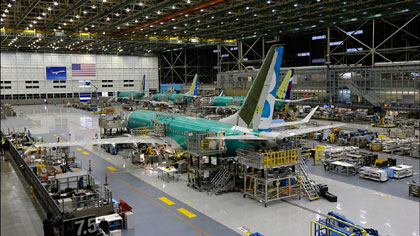Return to Labor News | Return to Home page
Published October 7, 2019 in The Seattle Times
Boeing Rejected 737 MAX Safety Upgrades Before Fatal Crashes, Whistleblower Says

By Dominic Gates, Steve Miletich and Lewis Kamb
Seven weeks after the second fatal crash of a 737 MAX in March, a Boeing engineer submitted a scathing internal ethics complaint alleging that management — determined to keep down costs for airline customers — had blocked significant safety improvements during the jet’s development.
The ethics charge, filed by 33-year-old engineer Curtis Ewbank, whose job involved studying past crashes and using that information to make new planes safer, describes how around 2014 his group presented to managers and senior executives a proposal to add various safety upgrades to the MAX.
The complaint, a copy of which was reviewed by The Seattle Times, suggests that one of the proposed systems could have potentially prevented the crashes in Indonesia and Ethiopia that killed 346 people. Three of Ewbank’s former colleagues interviewed for this story concurred.
The details revealed in the ethics complaint raise new questions about the culture at Boeing and whether the long-held imperative that safety must be the overarching priority was compromised on the MAX by business considerations and management’s focus on schedule and cost.
Managers twice rejected adding the new system on the basis of “cost and potential (pilot) training impact,” the complaint states. It was then raised a third time in a meeting with 737 MAX chief project engineer, Michael Teal, who cited the same objections as he killed the proposal.
A version of the proposed system, called synthetic airspeed, was already installed on the 787 Dreamliner.
It was not directly related to the flight-control system — the Maneuvering Characteristics Augmentation System (MCAS) — that contributed to both crashes. But it would have detected the false angle of attack signal that initiated events in both accidents, and so potentially could have stopped MCAS from activating and repeatedly pushing down the nose of each jet.
But installing it in the MAX would likely have meant 737 pilots needed extra training in flight simulators. Running thousands of pilots through simulator sessions would have delayed the jet’s entry into service and added substantial costs for Boeing’s airline customers, damaging the MAX’s competitive edge against the rival Airbus A320neo.
Ewbank’s complaint goes further than the decision not to install this one new system. He describes management as “more concerned with cost and schedule than safety and quality.” And he alleges that in one instance Boeing hid inflight safety incident data from the European Union Aviation Safety Agency (EASA).
As first reported in The Seattle Times, Boeing did an inadequate system safety assessment that missed flaws in the design of MCAS that were central to the two MAX disasters. And Boeing engineers were under pressure to limit safety testing to certify the MAX. These fresh allegations from inside Boeing indicate that the problems with jetmaker’s safety culture may go deeper than MCAS.
Submitted via Boeing’s internal whistleblower system, Ewbank’s complaint alleges that MAX program managers, concerned with avoiding higher costs and more pilot training, were intent on “shutting down trade studies that attempted to modernize the airplane and avoiding awareness of known issues encountered in historical 737 operation.”
Federal investigators
The FBI has interviewed at least two Boeing employees about the complaint. It’s unclear how the Boeing document reached the agency, but federal investigators are known to have issued subpoenas to the company.
Department of Justice prosecutors, Department of Transportation inspectors and Securities and Exchange Commission (SEC) officials are all involved in a wide-ranging federal investigation into possible wrongdoing at Boeing during certification of the MAX that was already under way before the engineer filed his internal complaint in April.
Boeing declined to comment on the details of the ethics complaint. Teal, 737 MAX chief project engineer, could not be reached for comment. The Department of Justice also declined to comment. The Seattle Times is not naming the employees who have been questioned by the FBI to protect the identity of the source of that information.
Ewbank declined to be interviewed. The Seattle Times is naming him because he identified himself in his complaint to Boeing.
The MAX has been grounded worldwide for almost seven months as Boeing works on a comprehensive fix to its flight-control systems that will satisfy air safety regulators around the globe. The final updates to the systems are expected to be submitted to the Federal Aviation Administration (FAA) this month, and Boeing anticipates clearance to return the jet to the sky in November.
Meanwhile, multiple investigations and reviews, internal and external, are examining what caused the deadly crashes. Last week, Boeing’s board announced a revamp of the company’s reporting structures aimed at producing better internal safety oversight. On Monday, Boeing chairman and chief executive Dennis Muilenburg said he’s “taking immediate steps” to implement those recommendations.
The engineer
Ewbank’s ethics complaint expressed concern about the possible personal consequences of stepping forward inside the company.
“Given the nature of this complaint, the fear of retaliation is high, despite all official assurances that this should not be the case,” he wrote. “There is a suppressive cultural attitude towards criticism of corporate policy — especially if that criticism comes as a result of fatal accidents.”
Ewbank wrote that co-workers told him in private they are afraid to speak up about similar safety concerns out of “fear for their jobs.”
In a statement responding to requests for comment this week, Boeing said it “has rigorous processes in place, both to ensure that such complaints receive thorough consideration and to protect the confidentiality of employees who make them.”